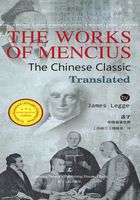
CHAPTER III
1. Mencius said, 'He who, using force, makes a pretence to benevolence is the leader of the princes.A leader of the princes requires a large kingdom.He who, using virtue, practises benevolence is the sovereign of the kingdom. To become the sovereign of the kingdom, a prince need not wait for a large kingdom. T'ang did it with only seventy lî, and king Wăn with only a hundred.
2. 'When one by force subdues men, they do not submit to him in heart. They submit, because their strength is not adequate to resist.


The image in 拔乎其萃 is that of stalks of grass or grain, shooting high above the level of the waving field. 未有盛于孔子,—'there has not been one more complete than Confucius'. But this would be no more than putting Confucius on a level with other sages. I have therefore translated after the example of ChûHsi, who says—自古圣人, 固皆异于众人, 然未有如孔子之盛者也. That 于=如 is one of the explanations of the character given by王引之, in his Treatise on theParticles.
CHAPTER 3. THE DIFFERENCE BETWEEN A CHIEFTAIN OF THE PRINCES AND A SOVEREIGN OF THE KINGDOM; AND BETWEEN SUBMISSION SECURED BY FORCE AND THAT PRODUCED BY VIRTUE.
1.霸 and 王 are here the recognized titles and not='to acquire the chieftaincy', 'to acquire the sovereignty'.In the 集证, we find much said on the meaning of the two characters. 王 is from three strokes (三), denoting heaven, earth, and man, with a fourth stroke, 一or unity, going through them, grasping and uniting them together, thus affording the highest possible conception of power or ability. 霸 is synonymous with伯, and of kindred meaning with the words, of nearly the same sound, 把, 'to grasp with the hand', and 迫,'to urge', 'to press'.


When one subdues men by virtue, in their hearts' core they are pleased, and sincerely submit, as was the case with the seventy disciples in their submission to Confucius. What is said in the Book of Poetry,
"From the west, from the east,
From the south, from the north,
There was not one who thought of refusing submission,"
is an illustration of this.'